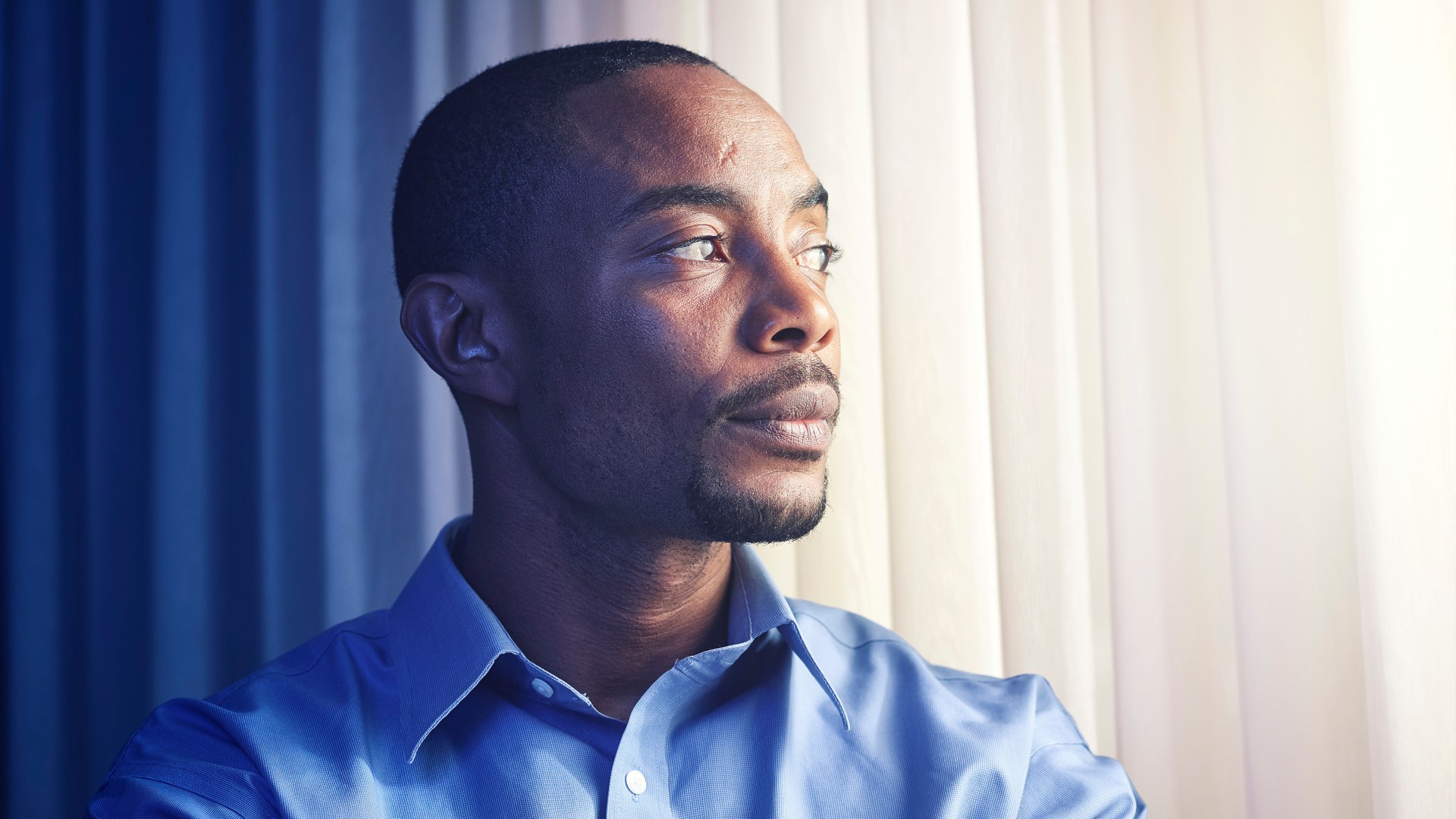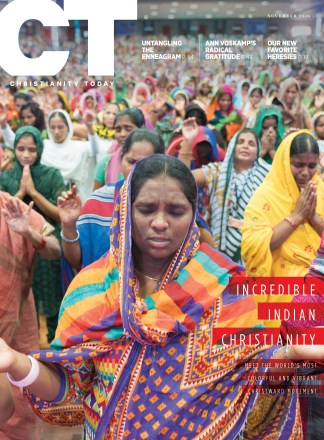We had heard the distant gunshots for a few weeks. But that morning they were close and seemed to ring out with purpose. I looked to my older brother and the other adults for reassurance. Their eyes were full of anguish and frustration. All we could do was wait.
The “freedom fighters” arrived. By mid-morning we were all lying face down in the house, listening as bullets whizzed through the air. Between bursts of gunfire, our typically bustling neighborhood was eerily silent. In the lull we could hear voices shouting instructions. If they found out my name, they would kill me.
Fantasies of Food
I was born in Liberia, West Africa, where my father served in the Special Security Service of President Samuel Doe (no relation), who had come to power through a violent military coup ten years earlier. His regime suppressed political opposition and rigged elections to stay in power. The “freedom fighters” had come to remove him, starting a war and killing anyone who worked in Doe’s government and anyone from his tribe. This was the situation in Liberia in August 1990. While the world was focused on Saddam Hussein and the Iraqi invasion of Kuwait, millions of Liberians were in the middle of a bloodbath.
I was 11. A year earlier I had lost my mother to illness. Now my father’s life was in danger. A few weeks before the rebel soldiers arrived, he had instructed me to go live with my brother, Roosevelt, and his wife. Bewildered and filled with questions, I packed a small bag with a few sets of clothes.
We lived behind rebel lines for three months, the hardest season of my life. The rebels were ruthless, murdering innocent people on the barest of suspicions.
While we hid, we ate one small meal a day, mostly rice and greens. Meat and clean water were scarce. Hope was scarcer. As children, we prefaced every statement about the future with, “If I live through the war, I will . . .” We lived on fantasies of food. We hadn’t been to school in six months.
By November 1990, President Doe had been killed, and peacekeepers were arriving from neighboring countries. The damage seemed beyond repair, and my innocence was irretrievable.
Roosevelt and I left Liberia on a refugee ship bound for neighboring Ghana in early November. Life was just returning to normal when I received word that my father had been killed. He had turned himself in to rebel forces on the promise of freedom for answering questions, and was never seen again.
I was an orphan. Whenever I was by myself, I cried. The war left my heart reeling.
Fantasies of Vengeance
Like many Liberians, Roosevelt and his wife were Christians. We went to church, but I had trouble believing in prayer. I had prayed that my mother wouldn’t die, and she did. I had prayed that my father wouldn’t die, and he did. Now I was scared to pray that my brothers and sister wouldn’t die.
And so my life’s goal changed. I wanted to find the soldier or soldiers who made me an orphan and make them pay. Wartime fantasies of food were replaced by fantasies of vengeance.
Soon, my brother and his wife applied to go to America as refugees, and in 1993 we arrived in Boston. I was both excited and scared. How would I be treated? Would I adjust to the schools, the crime, the cold weather? I had never felt temperatures below 75 degrees.
I wanted to find the soldier or soldiers who made an orphan and make them pay. Wartime fantasies of food were replaced by fantasies of vengeance.
I started school a few weeks later, a refugee living in my third country. But my time there was marred by chaos, poor grades, and disappointment. I couldn’t focus in classes. In quiet times, during quizzes and tests, and whenever I was alone, my thoughts returned to war.
I daydreamed of revenge. I cried myself to sleep most nights. I was existing but not living.
After barely graduating high school, I enlisted in the US Army with hopes of learning to use a deadly weapon. But about halfway through basic training, I was medically discharged due to a mild heart condition. I came home utterly embarrassed. What had my life become?
Still overcome by grief, I had lost hope for a brighter future. With no connection to God and no real walk with Christ, I had no source of comfort and no sense of purpose.
To make matters worse, Roosevelt —the only family member I knew to be alive—had a sudden heart attack at age 38. He slipped into a coma and was rushed to the hospital.
Alone in our home, I sat paralyzed in the basement, where I slept. Someone else close to me was going to die. I had nowhere to run. For hours I wept in complete darkness.
In that darkness, I turned to God. At first, all I had was one question: “Why?” I listed all the things that I blamed him for: Ma, Pa, the war, separation from family, their suffering, my disappointments—and now my brother, my beloved brother. I blamed God. Why?
I also blamed myself. Guilt overwhelmed me. I had chosen to hold on to the pain of my past and to nurse my desire for vengeance. I realized, in that darkness, that I could keep those fantasies alive, or I could relinquish them once and for all. I begged God to forgive me. I would let go of revenge and rage. I asked God, from the sincerest and deepest part of my heart, to save my brother.
Practicing Forgiveness
Four days later, I got news that Roosevelt would recover. That answered prayer was the first step in my journey to faith.
Still, it took years to trust God completely. As I grew in my faith, my mind—once a desert swept by anger and despair—became fertile ground. Flowers of faith and hope bloomed, though they were sometimes choked by the vicious thorns and weeds of hatred. For years I had comforted myself with the fantasy of killing the man who had killed my father. The roots of that destructive pattern went deep.
It wasn’t until 2008 that I began truly walking the road of forgiveness. I decided that I wanted to take the chance and find my father’s killer. At first I wasn’t sure what I would say. I sat across from an empty chair in my dining room and practiced saying, “I forgive you.” Sometimes, my monologue would get so intense that I would stand up and scream or break down and cry. I questioned my path. Did I really want to meet him this way?
Besides, the chances of finding him were slim to none. He wouldn’t want to be found. But the longer I practiced, the more resolved I became. I decided to travel halfway around the world to offer this man what Jesus offered me.
In 2010, at age 31, almost 20 years after I had left, I made my way back to Liberia. But I did not meet my father’s killer. He had died in the fighting.
Even so, I forgave him.
In that trip, God answered prayers, though not in the way I expected. Even without the fulfillment of my own plans, I could live in peace. I could forgive.
Today, I hope to share this hard-won peace and hope with fellow Liberians, so many of whom suffered greatly during our country’s brutal civil wars. My wife and I plan to run a self-sustaining farm that will support a library and community center. But more important, we’ll strive to bring gospel healing, a way to escape the darkness of Liberia’s violent past—a darkness I know all too well. Because wherever Jesus’ words of forgiveness are spoken, the future is bright with hope.
Marcus Doe is the author of Catching Ricebirds: A Story of Letting Vengeance Go (Hendrickson Publishers).











